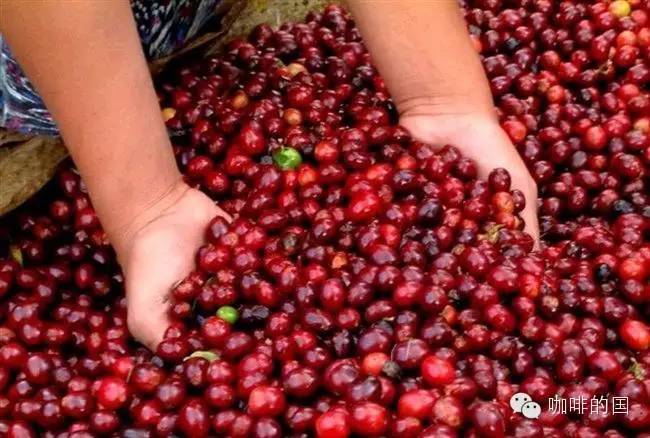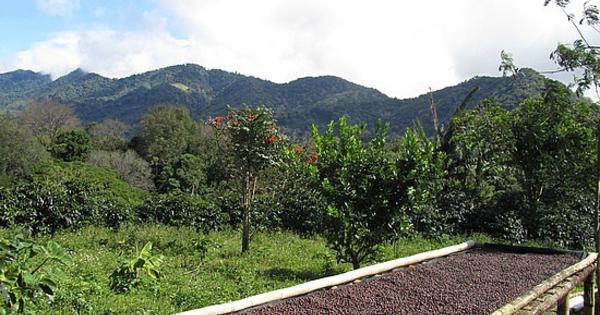Raw bean sun aricha Ethiopia imports Yega Xuefei Ariga boutique coffee
Yega Xuefei is produced at the Kebel Aricha processing plant, where there are about 650,700 small coffee farmers who send ripe coffee berries here for processing in exchange for cash. After the treatment plant selects the available berries, they are directly exposed to the sun on the scaffolding and are turned every 2-3 hours in the first few days to prevent overfermentation. After four to six weeks of sun exposure, the workers will scrape off the outer pulp with a machine according to the weather and temperature, and then transport it to addis for storage. Usually, sun-treated beans are stored in the form of shell beans, and they are not shelled until they are exported to ensure the quality of raw beans. This batch of Sunshine Eriga is rated as G1 by ECX. It is excellent in appearance, consistency, freshness, dry aroma and flavor of raw beans. You can't miss those who like bright acidity and strong berry flavor.
Flavor description: light fermented wine, jujube, sweet orange tone, dark berries, litchi, carambola, peach, peach, longan jujube, honey sweet, cocoa with a hint of spice, body thick and lasting
About Project Origin
The winner of the Sasa Sestic,2015 World Barista Competition and his business team ONA Coffee started a raw bean shopping program called Project Origin three years ago. The project works directly with coffee growers in poor countries and regions to improve their production conditions and give them a purchase price 20% higher than the fair trade price.
The original intention of the project also includes strengthening the links between roasters and coffee farmers and guiding coffee farmers to grow high-quality coffee beans. So far, Sasa has established relationships with coffee growers from eight countries, including Brazil, Panama, India, Ethiopia, El Salvador and Costa Rica.

Important Notice :
前街咖啡 FrontStreet Coffee has moved to new addredd:
FrontStreet Coffee Address: 315,Donghua East Road,GuangZhou
Tel:020 38364473
- Prev

Panama Baru volcano love god Cupid year high altitude raw bean rose summer content 30% Kadu Ekadura
Panamanian coffee originated in 1780, when European immigrants introduced the first Tipica tree species. Located in Central America, with the natural advantages of sunshine, land and mountains, coupled with a sufficient working population, the region is an excellent area for growing and producing high-quality boutique coffee, and it is a paradise for coffee. In particular, the Geisha coffee from Panama has led to the global customs.
- Next

Jamaica Coffee Flavor Silver Mountain Manor Jamaica Coffee Region Introduction Jamaica Blue Mountain Coffee
Jamaica is an Indian word meaning island of springs. In 1962, the Queen of England awarded Jamaica the coat of arms, a coat of arms with a red cross on a white ground. The red cross symbolizes Jamaica people's belief in Christianity and Catholicism. Five golden pineapples hang down and are distributed in the square and intersection of the cross, showing that Jamaica's planting industry is developed. A green crocodile lies on top of the national emblem;
Related
- Does Rose Summer choose Blue, Green or Red? Detailed explanation of Rose Summer Coffee plots and Classification in Panamanian Jade Manor
- What is the difference between the origin, producing area, processing plant, cooperative and manor of coffee beans?
- How fine does the espresso powder fit? how to grind the espresso?
- Sca coffee roasting degree color card coffee roasting degree 8 roasting color values what do you mean?
- The practice of lattes: how to make lattes at home
- Introduction to Indonesian Fine Coffee beans-- Java Coffee producing area of Indonesian Arabica Coffee
- How much will the flavor of light and medium roasted rose summer be expressed? What baking level is rose summer suitable for?
- Introduction to the characteristics of washing, sun-drying or wet-planing coffee commonly used in Mantenin, Indonesia
- Price characteristics of Arabica Coffee Bean Starbucks introduction to Manning Coffee Bean Taste producing area Variety Manor
- What is the authentic Yega flavor? What are the flavor characteristics of the really excellent Yejasuffi coffee beans?

